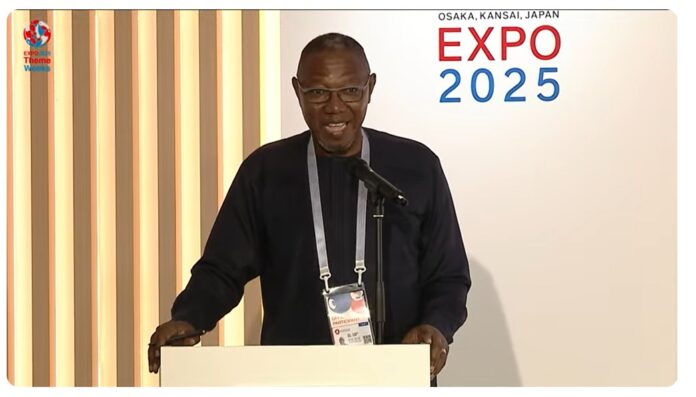Deputy Minister for Education, Dr. Clement Abas Apaak, has reiterated Ghana’s commitment to inclusive and future-oriented education.
He made the remarks during a special session organised by a Designated International Organisation (DINO) under the theme “Advancing STEM, TVET, and Remote Learning to Achieve SDGs – Goal 4 in Ghana.”
Dr. Apaak stressed the government’s prioritisation of Science, Technology, Engineering, and Mathematics (STEM) and Technical and Vocational Education and Training (TVET), describing them as key drivers of innovation, economic growth, and national development.
“Our government, the NDC government, recognises that STEM and TVET are essential to driving innovation, fostering economic growth, and addressing the complex challenges of the 24th century,” he stated.
He outlined Ghana’s education reform agenda, anchored on a SMART Curriculum that aims to introduce coding, digital literacy, and STEM from the basic level.
“We are initiating what we call the SMART curriculum, and this is to integrate seamlessly STEM, coding, and digital literacy into the basic school system. This, we believe, would ensure that from a very early age, students are exposed to technical and vocational concepts, sparking their interest and preparing them for future pathways,” he said.
At the secondary level, Ghana is embedding STEM into vocational skills, agriculture, civic education, design thinking, and life skills to create a holistic education system that merges theory with practical skills needed for employment and entrepreneurship.
Dr. Apaak highlighted ICT infrastructure as central to the country’s educational transformation.
“We are promoting digital literacy at the basic levels by providing computer facilities installed in digitized learning environments and upgrading ICT laboratories. We are also promoting solar energy as a primary energy source for school facilities.”
He noted that the government is collaborating with the private sector and digital experts to modernize ICT labs, train teachers, build new facilities for underserved areas, and support learners with disabilities.
To bridge the digital divide, ICT centers are being built in marginalized communities to offer shared access to computers, the internet, and online resources.
“We aim to enhance the availability of digital learning resources for schools and to provide universal Internet access to facilitate digital teaching and learning,” he added.
Dr. Apaak also referenced several e-learning platforms under the Ministry of Education and its digital education unit, CENDLOS.
These include I-Campus Ghana, Ghana Learning Passport, Minicraft Education Edition, Global Teacher Campus, and Emui TV.
He noted that these solutions address limited connectivity, platform interoperability, and accessibility for learners with disabilities.
He cited various STEM-related initiatives, such as the construction of STEM senior high schools, Girls in STEM programs, National Science and Maths Week, and the Robotics Olympia, as efforts to bridge gender gaps and promote innovation and excellence.
“In the area of educational technology in Ghana, we stand at a remarkable intersection of technology and education. We see EdTech as a strategic enabler to teach everyone, to help everyone, to harness, and to take advantage of remote systems to promote education,” he emphasized.
Flagship programmes like One Tech, One Teacher, One Laptop, the Smart Schools Project, and the national Learning Management System are all part of the country’s digital shift.
On TVET, Dr. Apaak explained that the government is aligning vocational education with smart technologies, artificial intelligence, and automation—positioning TVET as a first-choice path for learners.
“We are doing this because in Ghana there is a perception that suggests that TVET education is reserved for persons who are less intelligent or less academically inclined.
Through this approach, we are targeting and promoting strategies that would ensure that TVET becomes a first option.”
Smart classrooms, virtual laboratories, digital assessment tools, and improved internet infrastructure are being rolled out in TVET institutions, with instructor training at the core of the implementation strategy.
On sustainability, Dr. Apaak said the Ministry, through the Ghana TVET Service (GTVET), is integrating green principles into education to support climate action and green job preparedness.
Initiatives include the Green Schools Project, recycling systems, water and energy conservation, climate-smart agriculture, renewable energy, and green construction education.
“Ghana’s commitment to advancing STEM, TVET and remote learning is an integral part of our effort to achieve SDG and to build a prosperous, equitable, and sustainable future.
“We are dedicated to fostering innovation, leveraging technology, and forging a strong partnership to transform our educational system with a particular focus on strengthening TVET to meet the demands of the 21st-century economy,” he said.
He closed with gratitude to the organizers of EXPO 2025 for the opportunity to share Ghana’s progress.
“As the Deputy Minister for Ghana’s Education Ministry, I extend my deepest appreciation to Expo2025 here in Osaka for hosting this vital DINO to Ghana that continues to champion quality education, empower our youth, and shape the world where every individual has an opportunity to thrive. Once again, thank you for your attention.”
Joining Dr. Apaak at the event were Prof. Ernest Kofi Davis of the Ghana Education Service, Engr. Dr. Eric Kofi Adzrolo of the Commission for TVET (CTVET), and Dr. Diyawu Mumin of the Centre for National Distance Learning and Open Schooling (CENDLOS).
Also present was Ms. Nakajima Sachiko, Thematic Project Lead for “Empowering Lives” at EXPO 2025.
Ministry of Education
ALSO READ:



